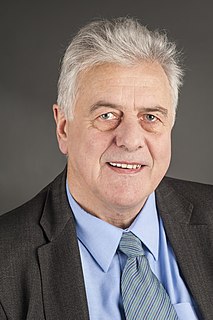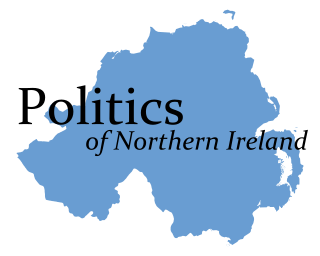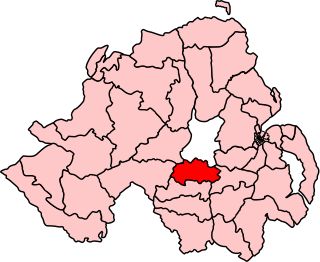
James Frederick Nicholson is a Northern Ireland Ulster Unionist Party politician, who is currently a Member of the European Parliament (MEP).

North Down is a parliamentary constituency in the United Kingdom House of Commons. The current MP is Sylvia Hermon, first elected in the 2001 general election. Hermon represented the constituency on behalf of the Ulster Unionist Party until 2010, subsequently sitting as an Independent.

Elections in Northern Ireland are held on a regular basis to local councils, the Northern Ireland Assembly, the Parliament of the United Kingdom, and to the European Parliament.
The by-election held in Fermanagh and South Tyrone on 9 April 1981 is considered by many to be the most significant by-election held in Northern Ireland during the Troubles. It saw the first electoral victory for militant Irish republicanism, which the following year entered electoral politics in full force as Sinn Féin. The successful candidate was the IRA hunger striker Bobby Sands who died twenty-six days later.

The Northern Ireland general election, 1965 was held on 25 November 1965. Like all previous elections to the Parliament of Northern Ireland, it produced a large majority for the Ulster Unionist Party. This was the last election in Northern Ireland in which one party won a majority of the vote. The Ulster Unionists increased their vote share largely due to a reduction in the number of uncontested seats, but also picked up two additional seats. Similarly, the Nationalist vote share decreased largely due to more of the seats in which they stood candidates being contested.
Independent Unionist has been a label sometimes used by candidates in elections in the United Kingdom, indicating a support for British unionism.

The 1986 Northern Ireland by-elections were fifteen by-elections held on 23 January 1986, to fill vacancies in the Parliament of the United Kingdom caused by the resignation in December 1985 of all sitting Unionist Members of Parliament (MPs). The MPs, from the Ulster Unionist Party, Democratic Unionist Party and Ulster Popular Unionist Party, did this to highlight their opposition to the Anglo-Irish Agreement. Each of their parties agreed not to contest seats previously held by the others, and each outgoing MP stood for re-election.
The Belfast South by-election was held on 4 March 1982 following the death of Robert Bradford, Ulster Unionist Party (UUP) Member of Parliament for Belfast South.

North Londonderry was a county constituency comprising the southern part of County Londonderry. It was created in 1929, when the House of Commons Act 1929 introduced first-past-the-post elections throughout Northern Ireland. It was created in 1929 as one of five single-member constituencies replacing the former five-member Londonderry constituency. The constituency survived unchanged, returning one member of Parliament until the Parliament of Northern Ireland was temporarily suspended in 1972, and then formally abolished in 1973.

Central Armagh was a constituency of the Parliament of Northern Ireland.

Mid Armagh was a constituency of the Parliament of Northern Ireland.

North Armagh was a constituency of the Parliament of Northern Ireland.
The Down by-election was held on 6 June 1946, following the death of James Little, the independent Unionist Member of Parliament for Down.
The Armagh by-election was held on 5 March 1948, following the death of Ulster Unionist Party Member of Parliament William Allen.
David Calvert is a Unionist politician in Northern Ireland. He worked as a director of a family shirt manufacturing company. He was a founder member of the Democratic Unionist Party (DUP) in County Armagh.
This is a summary of the electoral history of Margaret Thatcher, who served as Prime Minister of the United Kingdom from 1979 to 1990 and Leader of the Conservative Party from 1975 to 1990. She was the Member of Parliament (MP) for Finchley from 1959 to 1992.

The 2015 United Kingdom general election in Northern Ireland was held on 7 May 2015 and all 18 seats were contested.
The 1955 United Kingdom general election in Northern Ireland was held on 26 May as part of the wider general election with 12 MPs elected in single-seat constituencies using first-past-the-post.
The February 1974 United Kingdom general election in Northern Ireland was held on 28 February with 12 MPs elected in single-seat constituencies using first-past-the-post as part of the wider general election in the United Kingdom.









